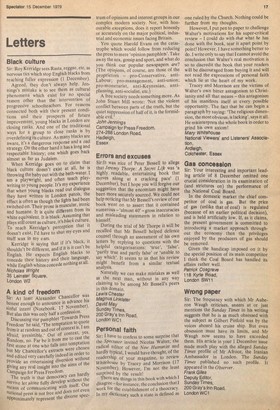A kind of freedom
Sir: At least Alexander Chancellor was honest enough to announce in advance his sinful intent (Notebook, 17 November). But alas this was only half a confession. Discussing our pamphlet 'Towards Press Freedom' he said, 'The temptation to quote from it at random and out of context is, I am afraid, irresistible.' Out of context, yes. F:andom, no. Far be it from me to cast the first stone at one who falls into temptation but Mr Chancellor's extracts were chosen and edited very carefully indeed in order to Provide an entertaining diversion without giving any real insight into the aims of the Campaign for Press Freedom. The truth is that democracy can hardly survive let alone fully develop without the Means of communicating with itself. Our national press is not free and does not even approximately represent the diverse spec trum of opinions and interest groups in our complex modern society. Nor, with honourable exceptions, does it report honestly or accurately on the major political, industrial and economic issues facing Britain.
You quote Harold Evans on the catastrophe which would follow from reducing the press to mere 'opinion pamphlets'. Take away the sex, gossip and sport, and what do you think our popular newspapers are? (The opinions, of course, are those of the proprietors — pro-Conservative, antiLabour; pro-management, anti-union; pro-monetarist, anti-Keynesian, antiplanning, anti-socialist, etc.) A free society needs something more. As John Stuart Mill wrote: 'Not the violent conflict between parts of the truth, but the quiet suppression of half of it, is the formidable evil.'
John Jennings Campaign for Press Freedom, 274-288 London Road, Hadleigh, Essex


































 Previous page
Previous page